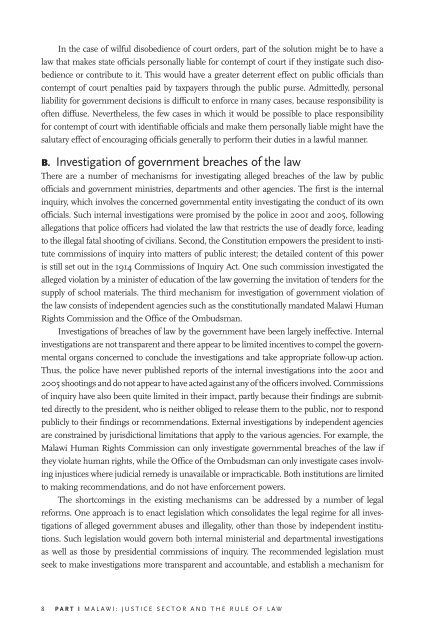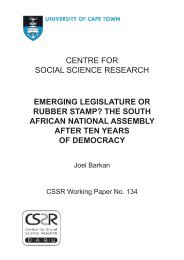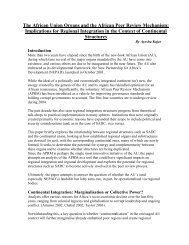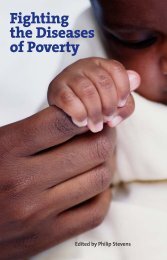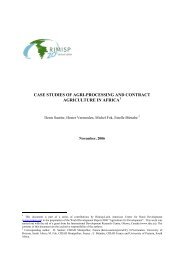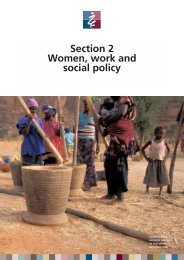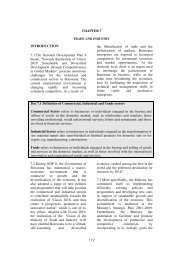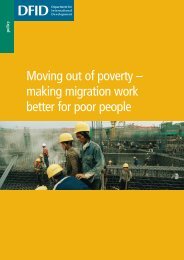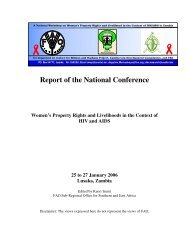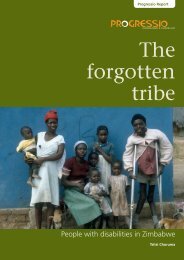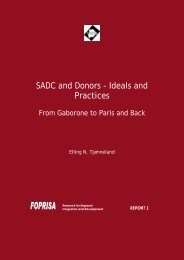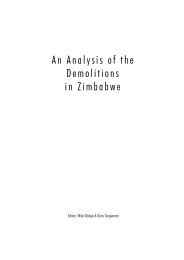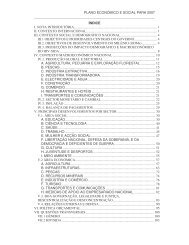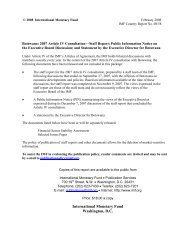Justice Sector and the Rule of Law - AfriMAP
Justice Sector and the Rule of Law - AfriMAP
Justice Sector and the Rule of Law - AfriMAP
Create successful ePaper yourself
Turn your PDF publications into a flip-book with our unique Google optimized e-Paper software.
In <strong>the</strong> case <strong>of</strong> wilful disobedience <strong>of</strong> court orders, part <strong>of</strong> <strong>the</strong> solution might be to have alaw that makes state <strong>of</strong>ficials personally liable for contempt <strong>of</strong> court if <strong>the</strong>y instigate such disobedienceor contribute to it. This would have a greater deterrent effect on public <strong>of</strong>ficials thancontempt <strong>of</strong> court penalties paid by taxpayers through <strong>the</strong> public purse. Admittedly, personalliability for government decisions is difficult to enforce in many cases, because responsibility is<strong>of</strong>ten diffuse. Never<strong>the</strong>less, <strong>the</strong> few cases in which it would be possible to place responsibilityfor contempt <strong>of</strong> court with identifiable <strong>of</strong>ficials <strong>and</strong> make <strong>the</strong>m personally liable might have <strong>the</strong>salutary effect <strong>of</strong> encouraging <strong>of</strong>ficials generally to perform <strong>the</strong>ir duties in a lawful manner.There are a number <strong>of</strong> mechanisms for investigating alleged breaches <strong>of</strong> <strong>the</strong> law by public<strong>of</strong>ficials <strong>and</strong> government ministries, departments <strong>and</strong> o<strong>the</strong>r agencies. The first is <strong>the</strong> internalinquiry, which involves <strong>the</strong> concerned governmental entity investigating <strong>the</strong> conduct <strong>of</strong> its own<strong>of</strong>ficials. Such internal investigations were promised by <strong>the</strong> police in 2001 <strong>and</strong> 2005, followingallegations that police <strong>of</strong>ficers had violated <strong>the</strong> law that restricts <strong>the</strong> use <strong>of</strong> deadly force, leadingto <strong>the</strong> illegal fatal shooting <strong>of</strong> civilians. Second, <strong>the</strong> Constitution empowers <strong>the</strong> president to institutecommissions <strong>of</strong> inquiry into matters <strong>of</strong> public interest; <strong>the</strong> detailed content <strong>of</strong> this poweris still set out in <strong>the</strong> 1914 Commissions <strong>of</strong> Inquiry Act. One such commission investigated <strong>the</strong>alleged violation by a minister <strong>of</strong> education <strong>of</strong> <strong>the</strong> law governing <strong>the</strong> invitation <strong>of</strong> tenders for <strong>the</strong>supply <strong>of</strong> school materials. The third mechanism for investigation <strong>of</strong> government violation <strong>of</strong><strong>the</strong> law consists <strong>of</strong> independent agencies such as <strong>the</strong> constitutionally m<strong>and</strong>ated Malawi HumanRights Commission <strong>and</strong> <strong>the</strong> Office <strong>of</strong> <strong>the</strong> Ombudsman.Investigations <strong>of</strong> breaches <strong>of</strong> law by <strong>the</strong> government have been largely ineffective. Internalinvestigations are not transparent <strong>and</strong> <strong>the</strong>re appear to be limited incentives to compel <strong>the</strong> governmentalorgans concerned to conclude <strong>the</strong> investigations <strong>and</strong> take appropriate follow-up action.Thus, <strong>the</strong> police have never published reports <strong>of</strong> <strong>the</strong> internal investigations into <strong>the</strong> 2001 <strong>and</strong>2005 shootings <strong>and</strong> do not appear to have acted against any <strong>of</strong> <strong>the</strong> <strong>of</strong>ficers involved. Commissions<strong>of</strong> inquiry have also been quite limited in <strong>the</strong>ir impact, partly because <strong>the</strong>ir findings are submitteddirectly to <strong>the</strong> president, who is nei<strong>the</strong>r obliged to release <strong>the</strong>m to <strong>the</strong> public, nor to respondpublicly to <strong>the</strong>ir findings or recommendations. External investigations by independent agenciesare constrained by jurisdictional limitations that apply to <strong>the</strong> various agencies. For example, <strong>the</strong>Malawi Human Rights Commission can only investigate governmental breaches <strong>of</strong> <strong>the</strong> law if<strong>the</strong>y violate human rights, while <strong>the</strong> Office <strong>of</strong> <strong>the</strong> Ombudsman can only investigate cases involvinginjustices where judicial remedy is unavailable or impracticable. Both institutions are limitedto making recommendations, <strong>and</strong> do not have enforcement powers.The shortcomings in <strong>the</strong> existing mechanisms can be addressed by a number <strong>of</strong> legalreforms. One approach is to enact legislation which consolidates <strong>the</strong> legal regime for all investigations<strong>of</strong> alleged government abuses <strong>and</strong> illegality, o<strong>the</strong>r than those by independent institutions.Such legislation would govern both internal ministerial <strong>and</strong> departmental investigationsas well as those by presidential commissions <strong>of</strong> inquiry. The recommended legislation mustseek to make investigations more transparent <strong>and</strong> accountable, <strong>and</strong> establish a mechanism for


